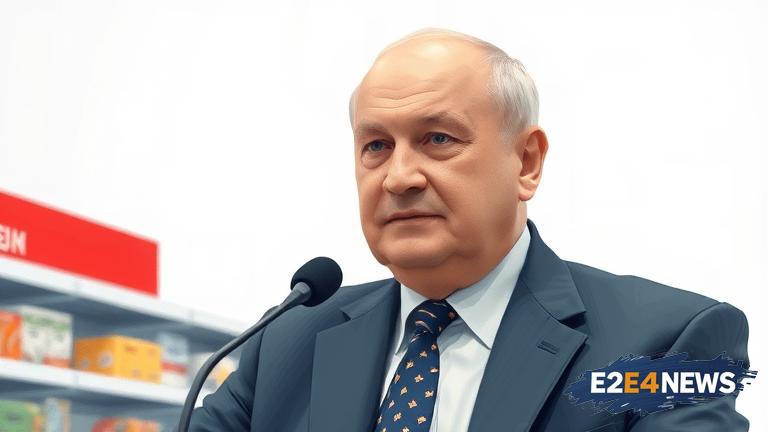In a recent address, Belarus President Alexander Lukashenko underscored the importance of establishing an efficient retail service system that caters to the needs of all citizens, regardless of their geographical location. This initiative aims to bridge the gap between urban and rural areas, ensuring that everyone has access to quality products and services. Lukashenko highlighted the significance of retail in the country’s economy, noting that it plays a crucial role in driving growth and development. He emphasized that the government should focus on creating a favorable business environment, encouraging entrepreneurship, and investing in infrastructure to support the retail sector. The president also stressed the need for innovation and digitalization in retail, enabling businesses to adapt to changing consumer behaviors and preferences. Furthermore, Lukashenko called for improved logistics and transportation systems to facilitate the timely delivery of goods to rural areas. He acknowledged the challenges faced by rural communities, including limited access to basic necessities, and emphasized the government’s commitment to addressing these issues. The president instructed relevant authorities to develop and implement effective strategies for enhancing retail services in rural areas. This includes investing in e-commerce platforms, mobile shops, and other innovative solutions to reach remote communities. Lukashenko also encouraged private sector participation in the retail industry, promoting public-private partnerships to stimulate growth and investment. Additionally, he emphasized the importance of training and upskilling retail professionals to provide high-quality services and enhance customer satisfaction. The president’s vision for an efficient retail service system is aligned with the country’s overall development strategy, which prioritizes economic growth, social welfare, and regional development. By focusing on retail, the government aims to create new opportunities for employment, income generation, and poverty reduction. Lukashenko’s initiative has been well-received by stakeholders, including retailers, consumers, and local authorities, who recognize the potential benefits of improved retail services. The implementation of this initiative is expected to have a positive impact on the country’s economy, contributing to increased consumer spending, improved living standards, and enhanced economic competitiveness. As Belarus continues to navigate the challenges of a rapidly changing global economy, the president’s emphasis on retail development is seen as a strategic move to drive growth, innovation, and social progress. The government’s commitment to supporting rural communities and promoting inclusive economic development is also expected to yield long-term benefits, including reduced income inequality and improved access to basic services. Overall, Lukashenko’s call for an efficient retail service system reflects the government’s dedication to creating a more equitable, prosperous, and connected society. With its focus on innovation, digitalization, and regional development, this initiative has the potential to transform the retail landscape in Belarus, benefiting citizens, businesses, and the economy as a whole. The president’s vision for a modern, efficient, and inclusive retail sector is expected to inspire confidence among investors, consumers, and stakeholders, contributing to a brighter economic future for Belarus. As the country moves forward with this initiative, it is likely to serve as a model for other nations seeking to enhance their retail sectors and promote economic growth. By prioritizing retail development, the government of Belarus is taking a proactive approach to addressing the needs of its citizens, driving economic progress, and securing a more prosperous future for generations to come.
